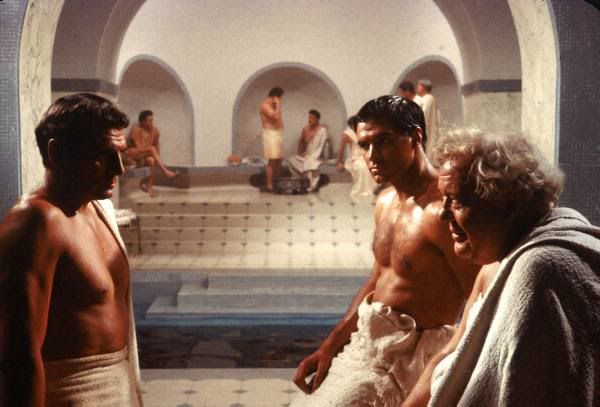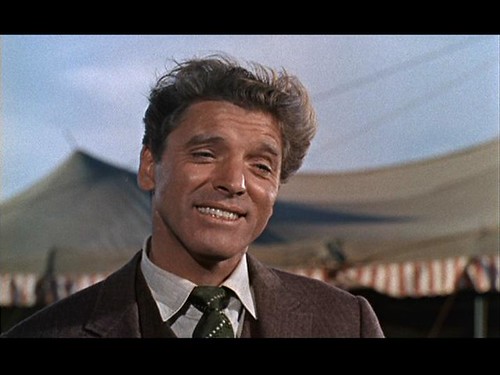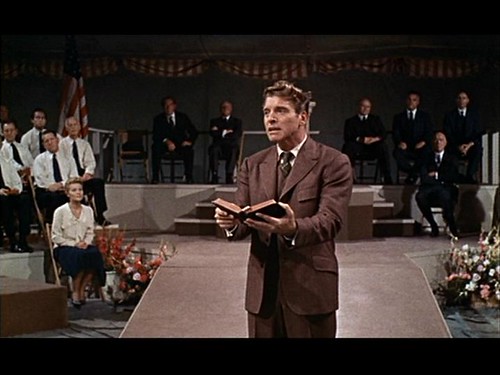Spartacus (Stanley Kubrick, 1960)
I just showed
Spartacus to Sarah for the first time, so I had to explain all the behind-the-scenes trivia about the film and its restoration. I'm going to go into that later, but first I want to discuss the film itself.
Spartacus is a lavish, epic film about a slave revolt against the Roman Empire some time before Julius Caesar became Emperor. Kirk Douglas, the executive producer, plays Spartacus as a very dignified slave who becomes the slave army's leader. The film is jam-packed with big name stars. Jean Simmons plays the lovely slave Varinia who becomes Spartacus' wife, Tony Curtis plays a "singer of songs" who wants to fight, Laurence Olivier and Charles Laughton play rival Roman senators, Peter Ustinov plays the jovial head of a gladiator school, and there are dozens of other recognizable names and faces playing smaller roles in the three-hour-plus film.

The film begins at the salt mines of Libya where Spartacus is purchased to train to become a gladiator. The subsequent scenes at the gladiatorial school have always been my favorite part of the film, especially the scenes involving the trainer (Charles McGraw), Spartacus' tender meeting of Varinia, and the high point of the entire film, the duel to the death with Draba (Woody Strode) before the patrician Crassus (Olivier), his protege Glabrus (John Dall) and their two lady companions (Nina Foch and Joanna Barnes). Later, after the slaves revolt, the film focuses on their attempt to leave Italy, and Rome's tactics to thwart them and stop the legend of Spartacus from snowballing into the heart of every single slave in the Empire.
Spartacus went through a lot of creative hassles to make it to the screen. First off, Kirk Douglas wanted to use blacklisted Dalton Trumbo for the script, and then he wanted to go ahead and credit Trumbo himself in the credits; when he did so, Douglas effectively broke the Black List in Hollywood. Then, western-veteran Anthony Mann was hired to direct, and he did direct the spectacular opening scenes in Libya, but he and Douglas had a falling out, so he was fired. Mann subsequently directed two gargantuan epics,
El Cid and
The Fall of the Roman Empire. Douglas went looking for a director and found one in Kubrick who had directed him in
Paths of Glory. Kubrick was available because he was fired/had quit (depending on who says what) as director of Marlon Brando's
One-Eyed Jacks. Kubrick directed the film but felt constricted because he didn't have his usual total sayso over the script, production, casting and final cut. Kubrick did actually shoot much of the film himself, although Russell Metty got the film credit and the Best Color Cinematography Oscar. Based on his experience with
Spartacus, Kubrick moved to England to get away from Hollywood and to be able to make all his subsequent films with total control. Even so,
Spartacus was a big critical and popular hit. The major naysayers were people like Hedda Hopper and John Wayne who called it Commie propaganda before it was ever screened.
Since
Spartacus is seen by some viewers as less than a pure Kubrick film, a group of film buffs deign it to be less significant, entertaining and absorbing than his other films, but I've never understood that. I will admit that the film seems less "Kubrickian", but there are still some major Kubrick touches, and the film is compelling all the way through. One personal touch which I find the most moving in the film is the way Kubrick films the scenes of the simple people while Tony Curtis "sings" his song about going home. With the most beautiful part of the musical score playing in the background and Curtis's voice in the forground, a series of naturalistically-photographed scenes are shown of babies and families resting and dreaming of returning home yet knowing that they still have a tough fight ahead of them. In fact, Kubrick reprises the mood and texture of this scene when Spartacus later walks through the camp the night before the biggest battle of the campaign while the camera tracks along with him. The people are all looking directly into Spartacus' eyes with hope, whether they're nine or ninety-years-old. That is pure Kubrick, and the fact that he probably shot those scenes himself (and I'd say it was obvious that he edited them too) makes them very Kubrickian for those who care.
Another thing which is interesting to note while watching
Spartacus is the way that after the opening scenes in Libya and some of the battle scenes, many of the scenes with the big name cast seem to be shot on sound stages while the humongous crowd scenes (usually
sans the stars) are filmed on location. This was Kubrick's choice. He wanted to work with the actors on the sound stage so that he could have more control (this is a technique he shared with Hitchcock, among others). Sometimes, it may seem a bit odd or "phony" to modern viewers, but it works well enough in the movie. You don't really watch
Spartacus thinking how phony it is. For one thing, the movie's cast most all give superlative performances, balancing the witty (Ustinov and Laughton, apparently benefitting from a rewrite of their scenes by Ustinov himself) with the sincere (Douglas, Curtis and Simmons) and the menacing (Olivier and McGraw).
Spartacus is a film I loved as a little kid, and I enjoy it just as much now as an Old Fart.
One other thing to mention about
Spartacus is its restoration in 1991 and release to theatres that year (I saw it on the Big Newport's gigantic screen). Many scenes of violence were restored, including the ones using actors with one arm made up to have a prosthetic arm chopped off, as well as extra blood and guts in a few scenes which were deemed "sickening" by the Legion of Decency at the time. However, the most significant of the restored scenes was the one where Laurence Olivier tried to seduce his servant Tony Curtis by using a snails and oysters analogy. The film's restorers had access to the images of the scene but the soundtrack had been lost and Laurence Olivier had already died. Tony Curtis could redub his own dialogue (mostly delivered in long shot), but it took a suggestion from Olivier's widow Joan Plowright to enable the scene to be restored. Plowright remembered that Anthony Hopkins did a perfect Olivier impression at a cocktail party, so she suggested him, he agreed and the voice you hear on the soundtrack is Sir Tony dubbing Lord Larry.


 On the plus side, at least it's not top 40.
On the plus side, at least it's not top 40.

 . Forgive me for quoting such long passages here, both from my mafo MoFo Top 100.
. Forgive me for quoting such long passages here, both from my mafo MoFo Top 100.




